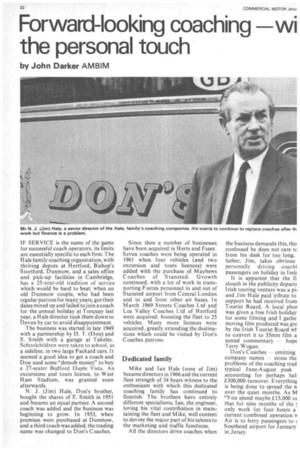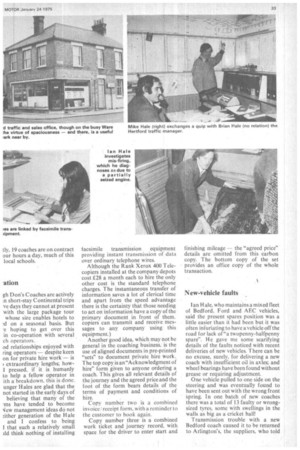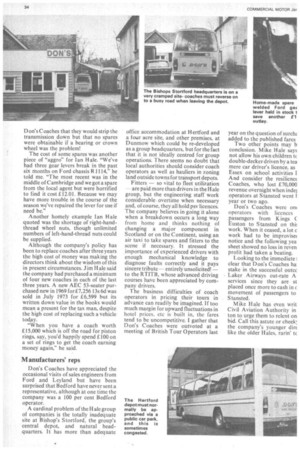Forward-looking coaching wi the personal touch
Page 34

Page 35

Page 36

If you've noticed an error in this article please click here to report it so we can fix it.
by John Darker AMBIM
IF SERVICE is the name of the game for successful coach operators, its limits are essentially specific to each firm. The H ale family coaching organization, with thriving depots at Hertford, Bishop's Stortford, Dunmow, and a sales office and pick-up facilities in Cambridge, has a 25-year-old tradition of service which would be hard to beat: when an old Dunmow couple, who had been regular patrons for many years, got their dates mixed up and failed to join a coach for the annual holiday at Torquay last year, a Hale director took them down to Devon by car to avoid disappointment.
The business was started in late 1949 with a partnership by D. T. (Don) and E. Smith with a garage at Takeley. Schoolchildren were taken to school, as a sideline, in two large Packard cars. It seemed a good idea to get a coach and Don used some "demob money" to buy a 27-seater Bedford Duple Vista. An excursions and tours licence, to West Ham Stadium, was granted soon afterwards.
N. 3. (Jim) Hale, Don's brother, bought the shares of E. Smith in 1951 and became an equal partner. A second coach was added and the business was beginning to grow. In 1953, when premises were purchased at Dunmow, and a third coach was added, the trading name was changed to Don's Coaches. Since then a number of businesses have been acquired in Herts and Essex. Seven coaches were being operated in 1961 when four vehicles (and two excursion and tours licences) were added with the purchase of Mayhews Coaches of Stansted. Growth continued, with a lot of work in transporting Forces personnel in and out of Stansted airport from Central London and to and from other air bases. In March 1969 Streets Coaches Ltd and Lea Valley Coaches Ltd of Hertford were acquired, boosting the fleet to 25 vehicles. Many more licences were acquired, greatly extending the destinations which could be visited by Don's Coaches patrons.
Dedicated family
Mike and Ian H ale (sons of Jim) became directors in 1966 and the current fleet strength of 34 bears witness to the enthusiasm with which this dedicated coaching family has continued to flourish. The brothers have entirely different specialisms, Ian, the engineer, loving his vital contribution in maintaining the fleet and M ike, well content to devote the major part of his talents to the marketing and traffic functions.
All the directors drive coaches when the business demands this, tho confessed he does not care tc from his desk for too long, father, Jim, takes obvious personally driving coachl passengers on holiday in I relz It is apparent that the fi slouch in the publicity departr Irish touring venture was a pi, and Jim H ale paid tribute to support he had received from Tourist Board. A local phoi was given a free Irish holiday for some filming and I gathe moving film produced was gre by the Irish Tourist B oard to convert it to 35mm film a sound commentary — hope Terry Wogan.
Don's Coaches omitting company names stress the problems of the coaching trad typical June-August peak accounting for perhaps hall £300,000 turnover. EverythinE is being done to spread the IA over the quiet months. As M "You spend maybe £15,000 or that for nine months of the only work for four hours a current combined operation v Air is to ferry passengers to Southend airport for January in Jersey. tly, 19 coaches are on contract our hours a day, much of this local schools,
ation
gh Don's Coaches are actively in short-stay Continental trips ve days they cannot at present with the large package tour whose size enables hotels to ;c1 on a seasonal basis. But .e hoping to get over this in co-operation with several ch operators.
ad relationships enjoyed with ring operators — despite keen on for private hire work — is ■ extraordinary lengths; how1 pressed, if it is humanly to help a fellow operator in ith a breakdown, this is done. unger Hales are glad that the not started in the early days of believing that many of the Ins have tended to become e w management ideas do not .ither generation of the Hale and I confess to being i that such a relatively small ild think nothing of installing facsimile transmission equipment providing instant transmission of data over ordinary telephone wires.
Although the Rank Xerox 400 Telecopiers installed at the company depots cost £28 a month each to hire the only other cost is the standard telephone charges. The instantaneous transfer of information saves a lot of clerical time and apart from the speed advantage there is the certainty that those needing to act on information have a copy of the primary document in front of them. copiers can transmit and receive messages to any company using this equipment.) Another good idea, which may not be general in the coaching business, is the use of aligned documents in pre-printed "sets" to document private hire work. The top copy is an "Acknowledgment of hire" form given to anyone ordering a coach. This gives all relevant details of the journey and the agreed price and the foot of the form bears details of the terms of payment and conditions of hire.
Copy number two iS a combined invoice/ receipt form, with a rem inder to the customer to book again.
Copy number three is a combined work ticket and journey record, with space for the driver to enter start and finishing mileage — the "agreed price" details are omitted from this carbon copy. The bottom copy of the set provides an office copy of the whole transaction.
New-vehicle faults Ian Hale, who maintains a mixed fleet of Bedford, Ford and AEC vehicles, said the present spares position was a little easier than it had been but it was often infuriating to have a vehicle off the road for lack of "a twopenny-halfpenny spare". He gave me some scarifying details of the faults noticed with recent deliveries of new vehicles. There can be no excuse, surely. for delivering a new coach with insufficient oil in axles; and wheel bearings have been found without grease or requiring adjustment.
One vehicle pulled to one side on the steering and was eventually found to have been sent out with the wrong front *spring. In one batch of new coaches there was a total of 13 faulty or wrongsized tyres, some with swellings in the walls as big as a cricket ball!
Transmission trouble with a new Bedford coach caused it to be returned to Arlington's, the suppliers, who told Don's Coaches that they would strip the transmission down but that no spares were obtainable if a bearing or crown wheel was the problem!
The cost of some spares was another piece of "aggro" for Ian Hale. "We've had three gear levers break in the past six months on Ford chassis R1114," he told me. "The most recent was in the middle of Cambridge and we got a spare from the local agent but were horrified to find it cost £12.01. Because we may have more trouble in the course of the season we've repaired the lever for use if need be."
Another homely example Ian Hale quoted was the shortage of right-handthread wheel nuts, though unlimited numbers of left-hand-thread nuts could be supplied.
Although the company's policy has been to replace coaches after three years the high cost of money was making the directors think about the wisdom of this in present circumstances. Jim Hale said the company had purchased a minimum of four new coaches m each of the last three years. A new AEC 53-seater purchased new in 1969 for£7,256 13s 6d was sold in July 1973 for £6,599 but its written down value in the books would mean a present for the tax man, despite the high cost of replacing such a vehicle today.
"When you have a coach worth £15,000 which is off the road for piston rings, say, you'd happily spend £100 on a set of rings to get the coach earning money again," he said.
Manufacturers' reps
Don's Coaches have appreciated the occasional visits of sales engineers from Ford and Leyland but have been surprised that Bedford have never sent a representative, although at one time the company was a 100 per cent Bedford operator.
A cardinal problem of the H ale group of companies is the totally inadequate site at Bishop's S tortford, the group's central depot, and natural headquarters. It has more than adequate office accommodation at Hertford and a four acre site, and other premises, at Dunmow which could be re-developed as a group headquarters, but for the fact that it is not ideally centred for group operations. There seems no doubt that local authorities should consider coach operators as well as hauliers in zoning land outside towns for transport depots, Fitters — so vital to fleet utilization — are paid more than drivers in the H ale group, but the engineering staff work considerable, overtime when necessary and, of course, they all hold psv licences. The company believes in going it alone when a breakdown occurs a long way from home and thinks nothing of changing a major component in Scotland or on the Continent, using an air taxi to take spares and fitters to the scene if necessary. It stressed the importance of experienced drivers with enough mechanical knowledge to diagnose faults correctly and it pays sincere tribute — entirely unsolicited! — to the RTITB, whose advanced driving courses have been appreciated by company drivers.
The business difficulties of coach operators in pricing their tours in advance can readily be imagined. If too much margin for upward fluctuations in hotel prices, etc is built in, the fares tend to be uncompetitive. I gather that Don's Coaches were outvoted at a meeting of British Tour Operators last year on the question of surclu added to the published fares Two other points may b conclusion. Mike Hale says not allow his own children tc double-decker driven by a tea mere car driver's licence, as Essex on school activities I And consider the resilienct Coaches, who lost £70,000 revenue overnight when indei operators at Stansted went 1 year or two ago.
Don's Coaches were on operators with licences passengers from Kings C Euston to Stansted on thi! work. When it ceased, a lot c work had to be improvise( notice and the following yea sheet showed no loss in reven profit had taken a beating.
Looking to the immediate I clear that Don's Coaches ha' stake in the successful outcc Laker Airways cut-rate A services since they are st placed once more to cash in c movement of passengers to S tansted.
Mike Hale has even writ Civil Aviation Authority in ton to urge them to relent on bid. Call this astute or cheek: the company's younger dirt like the older Hales, rarin' tc




































































































